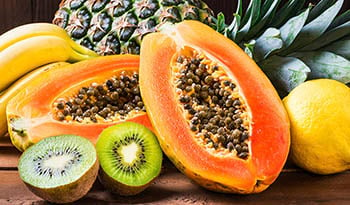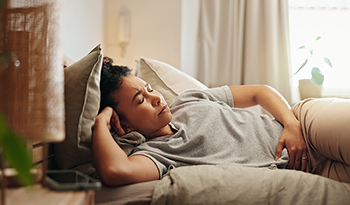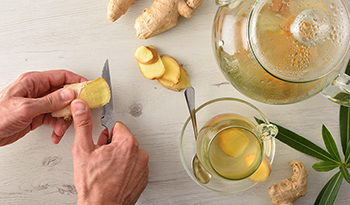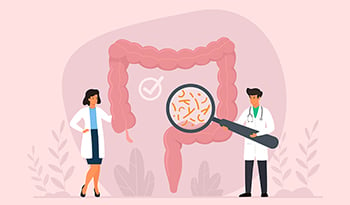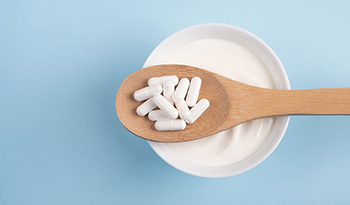What Are Psychobiotics? Here's Why Probiotics Could Benefit Mental Health
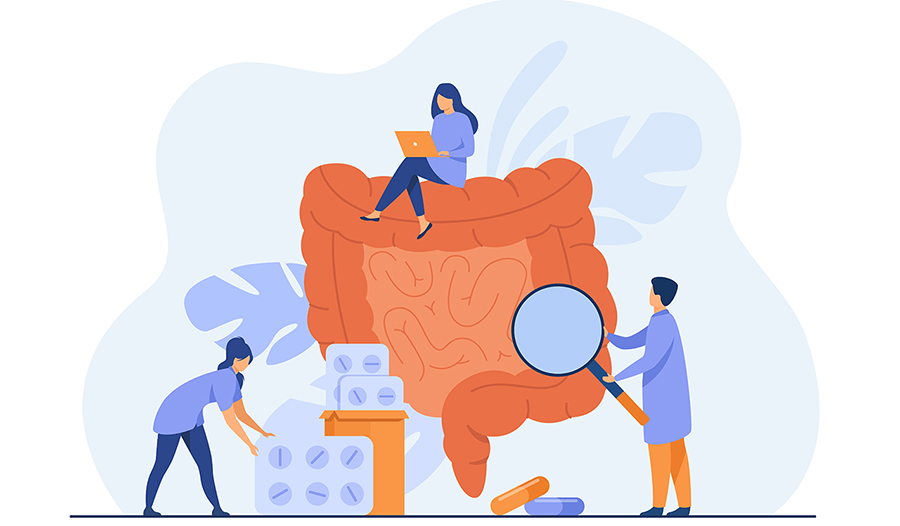
Mental health disorders are conditions that affect mood, behavior, and thought processes. According to the World Health Organization, 1 in 8 individuals struggle with mental health.
Furthermore, mental health disorders affect approximately 13% of children and adolescents worldwide. Could psychobiotics be beneficial in addressing mental health? If so, what are psychobiotics, and how could they help improve mental well-being?
What Are Psychobiotics?
Psychobiotics are probiotics and prebiotics that may offer mental health benefits by enhancing the growth of helpful bacteria in the gut. Research suggests that psychobiotics may play an essential role in how the gut microbiome interacts and communicates with the brain.
Psychobiotics are also thought to help reduce anxiety, depression and improve overall mood due to the beneficial effects that they may exert on the microbiome-gut-brain axis. This powerful combination of both probiotics and prebiotics deserves a closer look.
Probiotics
With the popularity of probiotics, there’s no doubt that you’ve heard of how beneficial these helpful bacteria may be. Probiotics are live bacteria, such as lactobacillus and bifidobacterium, that may help to improve health when ingested.
Probiotic Foods
Probiotics are usually found in fermented foods like yogurt, miso, tempeh, kefir, kombucha, and sauerkraut. While many bacteria are harmful and can be deadly to health, probiotics may benefit the body by helping to improve immune function, stool consistency, and even normalize bowel movements.
Vitamin Synthesis
They also help to synthesis vitamins, such as vitamin K2, as well as B vitamins, including pantothenic acid (vitamin B5), thiamin (vitamin B1), biotin, folate, and riboflavin (vitamin B2).
GI Benefits
Research also indicates that probiotics may help improve many different gastrointestinal disorders, from infectious diarrhea and ulcerative colitis to irritable bowel syndrome and necrotizing enterocolitis. Furthermore, studies suggest that probiotics may also benefit other conditions like eczema, atopic dermatitis, respiratory health, and even acne.
Prebiotics
Prebiotics are indigestible fibers that act as fuel for probiotics. Studies suggest that prebiotics may help alter the gut microbiome, reduce low-grade inflammation, and even help slow the growth of harmful bacteria.
Prebiotic Foods
Prebiotics include molecules like fructooligosaccharides and inulin. Foods high in prebiotics include asparagus, artichoke, banana, onion, and chicory. Because prebiotics can’t be digested or broken down by the human small intestine once consumed, the gut microflora in the colon goes to work breaking this fiber down.
Immune and Anti-Inflammatory Benefits
When prebiotics are digested or fermented by the gut flora, molecules called short-chain fatty acids (SCFAs) are produced. Studies link SCFAs to multiple health benefits, such as boosting the innate immune system and improving the lining of the intestines. SCFAs may also help reduce inflammation and protect against chronic colon disease.
Psychobiotics and Mental Health
Research suggests that psychobiotics—the combination of both probiotics and prebiotics—may benefit mental health by decreasing depression, reducing anxiety, and lowering inflammation.
Decreasing Depression
Depression is a complex mental health condition that can affect not just the mind but the body as a whole. Depression is linked to long-term increases in the hypothalamic-pituitary-adrenal axis (HPA) activity.
The HPA axis is an intricate interconnected combination pathway between the hypothalamus and pituitary gland in the brain and the adrenal glands that sit on top of the kidneys. It is one of the main pathways involved in the body’s stress response. Any abnormalities in the way that the HPA axis is regulated may increase the risk of developing depression.
The gut microbiome also plays an essential part in depression. Research shows that the gut microbiome of individuals with depression often differs greatly from healthy adults. Another interesting connection between depression and the gut is a breakdown of intestinal barrier, which is connected to the brain through nerve fibers.
Studies suggest that psychobiotics may play a key role in improving depression by regulating the HPA axis and improving the intestinal barrier. For example, one randomized, double-blind, placebo-controlled trial involved comparing individuals with major depressive disorder (MDD) who took psychobiotics to those who did not. After 8 weeks, the study found that, despite no dietary difference between the two groups, those who used a psychobiotic supplement had less feelings of depression, lower serum insulin levels, and higher levels of plasma glutathione.
Another randomized placebo-controlled study involving 40 individuals with depression found that those who took psychobiotics along with fluoxetine for depression had less depressive symptoms than those who took fluoxetine alone.
Yet another randomized placebo-controlled study involving adults with major depressive disorder found that those who received psychobiotics had less depressed symptoms than placebo alone.
Studies suggest that psychobiotics may also be beneficial for regulating the HPA axis in healthy individuals. One study placebo-controlled study involving 32 healthy adults under moderate psychological stress found that those taking the psychobiotic intervention had a higher number of healthy bacteria in the gut and more positive moods. The individuals taking the psychobiotics also had fewer feelings of tension, anger, confusion, and fatigue.
Reducing Anxiety
Research also indicates that psychobiotics may be beneficial for those who suffer from anxiety. Anxiety is a crippling mental health condition that causes feelings of nervousness, impending doom, panic, and restlessness. Physical signs of anxiety include trembling or shaking, sweating, breathing faster than normal, and even having a rapid heart rate.
Anxiety is linked to corticotropin-releasing hormone or CRH, the primary hormone involved in regulating the HPA axis. Studies suggest that psychobiotics may be beneficial for reducing anxiety through CRH regulation. One study involved 50 adults, 30 with laryngeal cancer and 20 healthy volunteers, awaiting surgery and measured their heart rates and CRH levels in the two weeks before their surgeries.
Twenty adults were randomly chosen to receive psychobiotic intervention. The adults who received psychobiotics had lower heart rates and serum levels of CRH. They also reported lower feelings of stress and anxiety.
Another study involved athletes who suffered from anxiety. The athletes were asked about their anxiety and stress levels at the beginning of the study and then given psychobiotics for 8 weeks. The study found that the athletes taking psychobiotics had a significant decrease in the perception of both anxiety levels and stress levels. They also had a significant decrease in the symptoms of anxiety that occur in the body like rapid heart rate and trembling.
One study that focused on individuals with a generalized anxiety disorder or eating disorders like anorexia nervosa or bulimia found that there was a significant change in the gut microbiome with the supplementation of psychobiotics. The changes in the gut microbiome led to a more diverse array of healthy bacteria, which could possibly be beneficial for mental health.
Lowering Inflammation
Animal studies involving psychobiotics for anxiety have found that their anti-anxiety-producing effects may be more than just regulating the HPA axis. Psychobiotics may also be able to reduce the amount of inflammation in the body.
Inflammation has been linked to many mental health conditions, most notably depression and anxiety. Inflammation occurs as an immune response to foreign invaders in the body. The purpose of inflammation is to rid the body of foreign invaders, but long-term inflammation can lead to negative health effects.
Studies suggest that psychobiotics may help reduce overall inflammation in the body, specifically neuroinflammation, or inflammation of the central nervous system. Lowering inflammation can have an anti-aging effect which can help to promote longevity.
Psychobiotics may help to reduce inflammation due to their effect on the number of immune cells, their function, and the pathways they take in the body to get to foreign invaders.
For example, one animal study found that an imbalance in the gut microbiome led to higher levels of inflammation in both the colon and the brain. The study found that supplementation with psychobiotics reduced the amount of inflammatory cytokines, or cell messengers, in the brain.
A meta-analysis, or a study that merges and analyzes the results from multiple independent studies, involved individuals with Alzheimer’s disease or mild cognitive impairment (MCI) and psychobiotics. The meta-analysis found that psychobiotics improved cognition for both those suffering from Alzheimer’s disease and MCI while also lowering blood markers of inflammation like malondialdehyde and high sensitivity C-reactive protein (hs-CRP).
Psychobiotics may help decrease inflammation by reducing the amount of reactive oxygen and nitrogen species in the body. Reactive oxygen and nitrogen species are huge contributors to free radical damages or oxidative stress. While they cause oxidative stress, they also play a role in increasing inflammation in the body through damaging protein and cell functions.
One study found that psychobiotics could increase the amount of helpful bacteria in the gut and lower inflammation in the body by acting as free radical scavengers and reducing oxidative stress.
Takeaway
Psychobiotics are possibly one of the most potent players when it comes to both gut and mental health. Research indicates that psychobiotics may play a significant role in helping to improve depression, anxiety, stress, cognition, and inflammation. The powerful combination of probiotics and prebiotics, known as psychobiotics may effectively support mental health.
References:
- Adikari AMGCP, Appukutty M, Kuan G. Effects of daily probiotic supplementation on football player’s stress and anxiety. Proceedings of the 5th International Conference on Physical Education, Sport, and Health (ACPES 2019). Atlantis Press; 2019.
- Akkasheh G, Kashani-Poor Z, Tajabadi-Ebrahimi M, et al. Clinical and metabolic response to probiotic administration in patients with major depressive disorder: a randomized, double-blind, placebo-controlled trial. Nutrition. 2016;32(3):315-320. doi:10.1016/j.nut.2015.09.003
- Bambury A, Sandhu K, Cryan JF, Dinan TG. Finding the needle in the haystack: systematic identification of psychobiotics. Br J Pharmacol. 2018;175(24):4430-4438. doi:10.1111/bph.14127
- Davani-Davari D, Negahdaripour M, Karimzadeh I, et al. Prebiotics: definition, types, sources, mechanisms, and clinical applications. Foods. 2019;8(3):92. Published 2019 Mar 9. doi:10.3390/foods8030092
- Del Toro-Barbosa M, Hurtado-Romero A, Garcia-Amezquita LE, García-Cayuela T. Psychobiotics: mechanisms of action, evaluation methods and effectiveness in applications with food products. Nutrients. 2020;12(12):3896. Published 2020 Dec 19. doi:10.3390/nu12123896
- Den H, Dong X, Chen M, Zou Z. Efficacy of probiotics on cognition, and biomarkers of inflammation and oxidative stress in adults with Alzheimer's disease or mild cognitive impairment - a meta-analysis of randomized controlled trials. Aging (Albany NY). 2020;12(4):4010-4039.
- Ghorbani Z, Nazari S, Etesam F, Nourimajd S, Ahmadpanah M, et al. The effect of symbiotic as an adjuvant therapy to fluoxetine in moderate depression: a randomized multicenter trial. Arch Neurosci. 2018;5(2):e60507. doi: 10.5812/archneurosci.60507.
- Hosseinifard ES, Morshedi M, Bavafa-Valenlia K, Saghafi-Asl M. The novel insight into anti-inflammatory and anxiolytic effects of psychobiotics in diabetic rats: possible link between gut microbiota and brain regions. Eur J Nutr. 2019;58(8):3361-3375. doi:10.1007/s00394-019-01924-7
- Kazemi A, Noorbala AA, Azam K, Eskandari MH, Djafarian K. Effect of probiotic and prebiotic vs placebo on psychological outcomes in patients with major depressive disorder: A randomized clinical trial. Clin Nutr. 2019;38(2):522-528. doi:10.1016/j.clnu.2018.04.010
- Khalesi S, Bellissimo N, Vandelanotte C, Williams S, Stanley D, Irwin C. A review of probiotic supplementation in healthy adults: helpful or hype?. Eur J Clin Nutr. 2019;73(1):24-37. doi:10.1038/s41430-018-0135-9
- Mental Disorders. World Health Organization. June 8, 2022. https://www.who.int/news-room/fact-sheets/detail/mental-disorders
- Morowitz MJ, Carlisle EM, Alverdy JC. Contributions of intestinal bacteria to nutrition and metabolism in the critically ill. Surg Clin North Am. 2011;91(4):771-viii. doi:10.1016/j.suc.2011.05.001
- Navarro-Tapia E, Almeida-Toledano L, Sebastiani G, Serra-Delgado M, García-Algar Ó, Andreu-Fernández V. Effects of microbiota imbalance in anxiety and eating disorders: probiotics as novel therapeutic approaches. Int J Mol Sci. 2021;22(5):2351. Published 2021 Feb 26. doi:10.3390/ijms22052351
- Polanczyk GV, Salum GA, Sugaya LS, Caye A, Rohde LA. Annual research review: a meta-analysis of the worldwide prevalence of mental disorders in children and adolescents. J Child Psychol Psychiatry. 2015;56(3):345-365. doi:10.1111/jcpp.12381
- Roudsari MR, Karimi R, Sohrabvandi S, Mortazavian AM. Health effects of probiotics on the skin. Crit Rev Food Sci Nutr. 2015;55(9):1219-1240. doi:10.1080/10408398.2012.680078
- Sabater-Molina M, Larqué E, Torrella F, Zamora S. Dietary fructooligosaccharides and potential benefits on health. J Physiol Biochem. 2009;65(3):315-328. doi:10.1007/BF03180584
- Sarkar A, Lehto SM, Harty S, Dinan TG, Cryan JF, Burnet PWJ. Psychobiotics and the manipulation of bacteria-gut-brain signals. Trends Neurosci. 2016;39(11):763-781. doi:10.1016/j.tins.2016.09.002
- Talbott SM, Talbott JA, Stephens BJ, Oddou MP. Effect of coordinated probiotic/prebiotic/phytobiotic supplementation on microbiome balance and psychological mood state in healthy stressed adults. Funct Food Health Dis. 2019;9(4):265–75.
- Tremblay A, Lingrand L, Maillard M, Feuz B, Tompkins TA. The effects of psychobiotics on the microbiota-gut-brain axis in early-life stress and neuropsychiatric disorders. Prog Neuropsychopharmacol Biol Psychiatry. 2021;105:110142. doi:10.1016/j.pnpbp.2020.110142
- Trzeciak P, Herbet M. Role of the intestinal microbiome, intestinal barrier and psychobiotics in depression. Nutrients. 2021;13(3):927. Published 2021 Mar 12. doi:10.3390/nu13030927
- Wilkins T, Sequoia J. Probiotics for gastrointestinal conditions: a summary of the evidence. Am Fam Physician. 2017;96(3):170-178.
- Yang H, Zhao X, Tang S, et al. Probiotics reduce psychological stress in patients before laryngeal cancer surgery. Asia Pac J Clin Oncol. 2016;12(1):e92-e96. doi:10.1111/ajco.12120
- Zhou J, Li M, Chen Q, et al. Programmable probiotics modulate inflammation and gut microbiota for inflammatory bowel disease treatment after effective oral delivery. Nat Commun. 2022;13(1):3432. Published 2022 Jun 14. doi:10.1038/s41467-022-31171-0
DISCLAIMER:This Wellness Hub does not intend to provide diagnosis...
















































































 Table of Contents
Table of Contents





